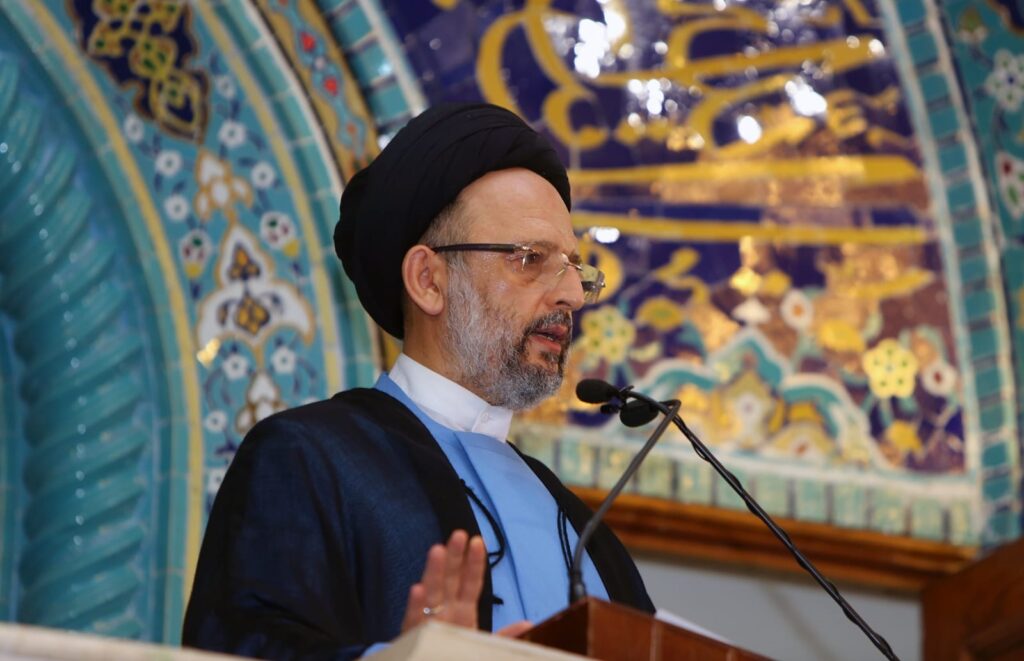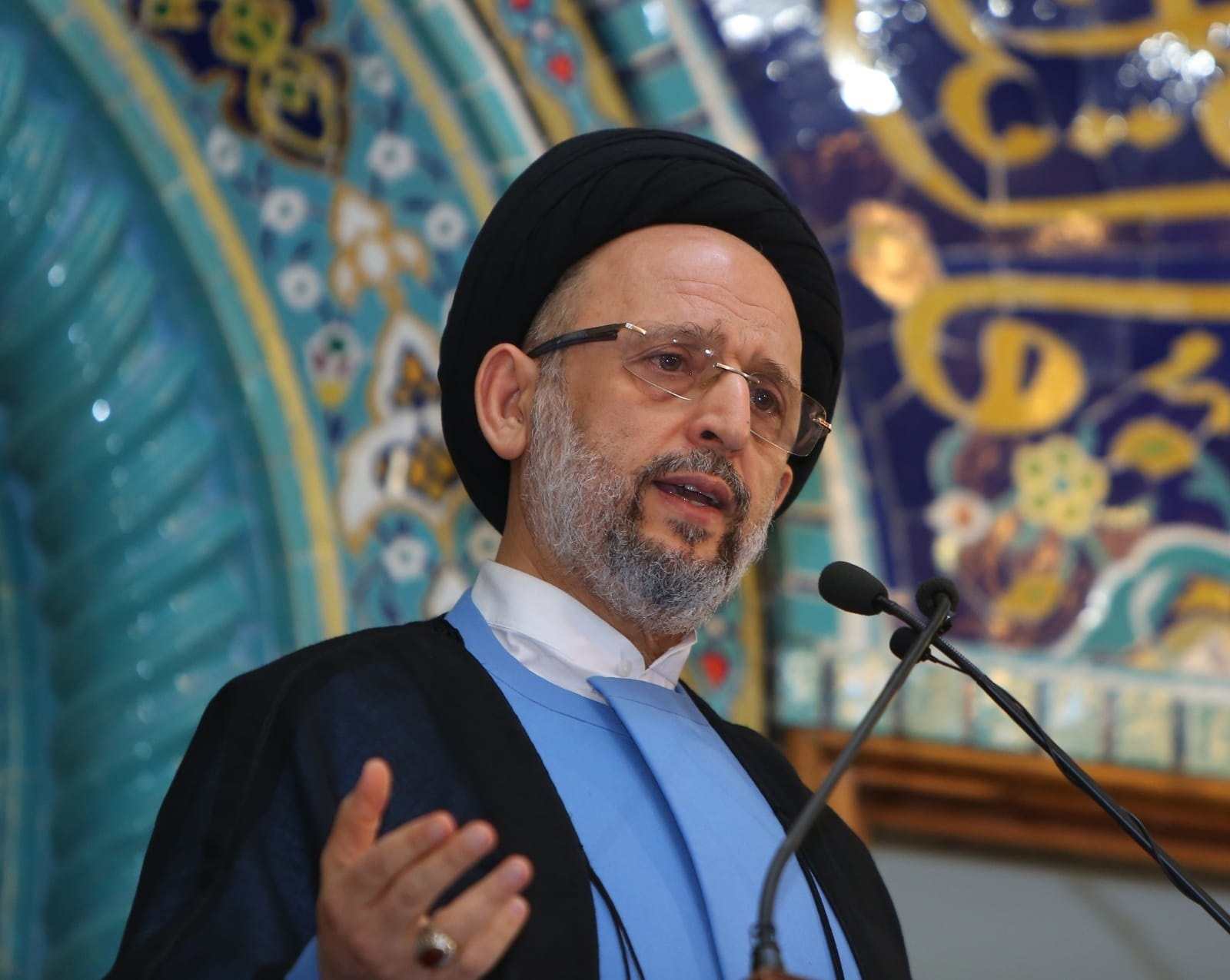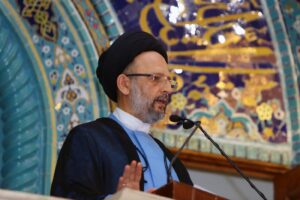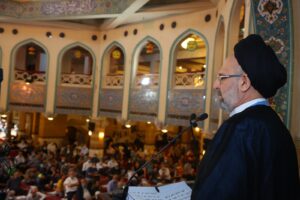In The Name of Allah, the Compassionate, The Merciful.
His Eminence, Sayyed Ali Fadlullah, delivered the two Friday prayer sermons at the Imamain Al-Hassanain Mosque, Zul Qida 27, 1444/June 16, 2023. Several prominent religious scholars, dignitaries, and hundreds of believers attended the Jumu’a prayer. Following is an edited text of the sermons.
The First Sermon
Obeying Allah and The Messenger: The path to your happiness in both worlds
Allah, The Most Exalted, says in His Glorious Book: O you, who have believed, obey Allāh and obey the Messenger and do not invalidate your deeds... Allah, the Most Exalted, speaks the Truth.
In this Ayat, Allah, the Most Exalted, calls on Muslims to obey Allah and the Messenger(p.); a path that leads to their happiness in both worlds. If we do not, thinking that performing the rituals is sufficient, we would then be like the woman who unravels her yarn, disintegrating it into pieces after she has spun it strongly. The Messenger(p.) pointed out to this Ayat when he said to his companions: One who says, ‘Glory be to Allah, the Most Exalted,’ Allah would Plant for him a tree in the Paradise; and one who says, ‘The Praise is for Allah’, Allah would Plant for him a tree in the Paradise and one who says, ‘There is no god except Allah’, Allah would Plant a tree for him in the Paradise; and one who says ‘Allah is the Greatest’, Allah, the Most Exalted, would Plant a tree for him in the Paradise’.
A man from Quraysh said, ‘O Messenger(p.) : There would be a lot of trees for us in Paradise!’ But the Prophet(p.) commented: ‘Yes, but beware of sending fires upon these that would incinerate them, and that is because Allah says: O you those who believe! Obey Allah and obey the Messenger(p.) and do not invalidate your deeds
The Honorable Hadiths and Holy Ayats have indicated some of the acts that cause the loss of the good deeds and the rewards that Allah, the Most Exalted, has promised us. One of these acts is ascribing partners to God, which is of two kinds: the first is worshipping stones, human beings and planets in such a way that, as Imam As-Sadiq(a.s.) explained, when you say: had it not been for so and so I would have perished, for you would be ascribing partners to Allah, the Most Exalted, that would share him His powers. Another act that leads to losing your good deeds is the reminder of generosity and hurtful words. Allah says: O believers! Do not waste your charity with reminders ˹of your generosity˺ or hurtful words, like those who donate their wealth just to show off and do not believe in Allah or the Last Day. Their example is that of a hard barren rock covered with a thin layer of soil hit by a strong rain—leaving it just a bare stone. Such people are unable to preserve the reward of their charity. Allah does not guide ˹such˺ disbelieving people.
In this context, The Messenger(p.) says: know that some people from my Ummah [ nation] will come on the Day of Judgment with good deeds like the white mountains of Tihama, but Allah will make them scattered dust.” Thawban said, ‘O Messenger of Allah, describe them to us, so that we may not be one of them without knowing it!’ He said, “They will be your brothers and from your people, and they will perform the night prayers as you do, but they are a people who, when they are alone, would violate the prohibitions of Allah. They would venture to commit them when nobody sees them, but not when they are in front of others.
Another Hadith says: One day the Prophet asked his companions whether they knew who the poor were. They answered that the poor were the ones who have no dirham or dinar (money)’ But he explained to them that: “In my Ummah, the poor is that man who would appear on the Day of the Judgment before Allah; he had offered prayers; he had paid Zakat; he had observed fast; but
he would have abused somebody, he would have falsely accused someone; he would have unauthorisedly taken someone else’s property; he would have murdered someone; would have hit somebody. Then all his virtues would
be given to his victims. If his virtues are finished before his wicked deeds are finished, then the errors and sins of the victims would be given to him and he would be thrown into Hell.
The Prophet (p.) also said: “A person shall be made to halt in front of the Glorious and Exalted Lord on the Day of Resurrection and handed over his book. On not seeing his good deeds therein he will say, ‘My God, this is not my book, for I don’t see my virtues in it.’ He will be told, ‘Verily, your Lord neither errs nor forgets. Your deeds are gone for your backbiting of the people.’ Then another person shall be brought and handed over his book. He will see in it many deeds of obedience (ta’at) and he will say: ‘My God, this is not my book, for I have not performed these deeds of obedience.’ He shall be told: ‘So and so committed your ghibah ( backbiting)and so his good deeds have been awarded to you…
Dear loved ones: the most severe calamity is when one strives all his life, performing all worshiping duties and all good deeds, but when the Day of Judgment comes – The day he expects to get his rewards and be saved from hellfire and enters paradise at a time there is no chance of compensating – he will be told that all your efforts are futile unless God has mercy on you.
He will be like the merchant who made a lot of money after years of hard work, but he lost and spent it and did not find it at a time of his need
Therefore, dear loved ones, we should monitor, and hold ourselves accountable, to make sure that what we say, hear and do does not disobey Allah, the Most Exalted, or harm anyone, so that we will not stand before God empty-handed.
And let our prayer be: Our Lord, let not our hearts deviate after You have guided us and grant us from Yourself mercy. Indeed, You are the Bestower.
The Second Sermon
Worshippers of Allah, The Most Exalted, I advise you and myself to follow the advice of Imam Al-Jawad, whose death anniversary is on the 29th of Zul Qida, to one of his companions. When the companion wrote to him saying: My father is an enemy to Ahlul Bayt (a.s) having a malicious thought towards them. I met distress and difficulties with him. Would you please pray to Allah for me? What do you see I shall do, may I die for you? Shall I talk to him openly or I shall humor him?’
Imam al-Jawad (a.s.) replied: ‘I understood your letter and what you mentioned about the case of your father. I shall not stop praying Allah for you inshallah. To humor your father is better for you than talking to him openly. Surely with difficulty, there is ease. Be patient for the end is to the pious.’
The young companion followed the advice of the Imam. He was always good to his father, no matter how badly the latter treated him, and He always addressed him politely and with what was best. Seeing this, the father reviewed his position and even became a follower of Ahl el-Beit.
Dear loved ones: we are in dire need to adopt the method the Imam called for in dealing with those we differ with whether in religion, sect, politics or any other domain. If we practice such an attitude we would win the people’s hearts, ensure that they will receive our message, and become more capable of confronting challenges…
We begin with the continuous Lebanese suffering from the living crisis. The majority of them have become incapable of securing the most basic living necessities, with some growing so desperate that they are thinking about committing suicide.
Despite all that, the political reality remains catastrophically divided without any glimpse of hope that those who run this country seek to find an end to the state of collapse the country has plunged into. Thus it has become clear that there is a dire need for building a state that can run the country’s affairs, starting by filling the presidency’s vacuum and forming a government that in addition to initiating economic revival, would institute reforms that would regain trust in this country.
Instead of joining hands to realize the hopes of the Lebanese, the political forces insist on increasing the division, thus, aggravating the political impasse as was evident in the last session to elect a president…
As each party feels that it has achieved in the last election round a big victory and as the political impasse persists, we call on the political parties that still feel that they ought to continue the battle of provoking and polarizing to gain more votes… not to put their stakes on these losing bets that threaten the unity and the fate of the country and save the time that is depleting what is left of its resources and move quickly to conduct a dialogue to reach a formula that ends this vacuum… having become clear that no party can take the country to where it wants or to impose its candidate.
These parties have to benefit from the window of opportunity that has opened as the external forces are calling the Lebanese to hurry up and elect a president of their own choice. This positive atmosphere should be reflected in driving the Lebanese to enhance the internal dialogue among them.
It is about time for putting an end to the nation’s tragedy and the pains of the Lebanese who are no longer able to endure anymore, especially that the state’s institutions, departments and what is left of its resources are crumbling and the social security is threatened.
We do not want the Lebanese who are returning to spend the summer with their families, although they know how much they are going to suffer, to see their country in such agony, as there is no water or electricity… This will increase their despair and frustration and drive them to decide not to return to their homeland…
In the meantime, the depositors’ suffering returns to the front stage, as their despair made them resort to the violence that neither they nor we want for them. This means that a solution for this problem should be reached by which the depositors would feel that there is some hope that their money will return to them even if at a later time …





